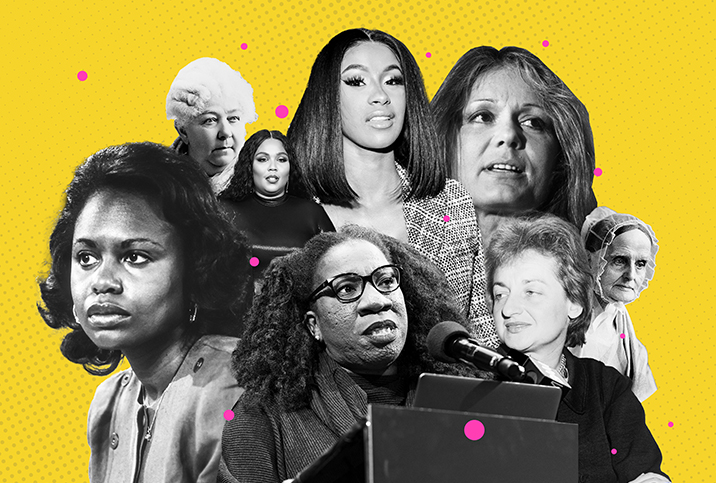Gender Equality Increases Life Expectancy for Everyone, Study Says

Key Points
- When women have rights, they boost their community.
- Life expectancy increases for all genders when women receive equal rights.
- Women who are denied equal opportunities create a ripple effect.
When a woman takes an active role in her own life, it doesn't just benefit her. The results can uplift an entire community, according to a recent study.
That begs an important question: Just how can progress toward gender equality improve life expectancy for everyone?
Why is gender equality important?
When women participate in different areas of society and play key roles in political, social and economic affairs, they can improve their quality of life, benefiting the whole community, a 2023 study in Plos Global Public Health suggested.
The researchers said that addressing gender inequality issues can impact the life expectancy of both women and men in a positive way.
A lack of equal rights restrict access to education, health care and economic independence.
"Women are the foundation of every society. They are truly the pillars that make the world go. In their roles as a mother, sister, daughter, friend, partner and a caregiver, they directly influence the health of our society," said Adeeti Gupta, M.D., an OB-GYN and founder of Walk In GYN Care, with practice locations in New York and Los Angeles.
How is life expectancy affected by gender equality?
"The Pinho-Gomes et al. study shows that in high-income countries, greater gender equality benefits the life expectancies of not only women but men. Living longer and healthier lives is an important goal for all members of society," said Stefanie Möllborn, Ph.D., a professor of sociology at Stockholm University in Sweden.
Researchers considered the following factors in the above-referenced study when determining if the gender gap in life affects longevity:
- Access to healthcare
- Exposure to pollution
- Education
- Income
Society benefits when women are able to actively engage in a variety of settings.
"As the Pinho-Gomes et al. study suggests, social determinants beyond healthcare are often more important than healthcare itself for extending people's lives," Möllborn said.
Women's life expectancy increased by 4.3 months, men's by 3.5 months, when the modified global gender gap index increased by 10 percent, according to the study data.
"The Global Gender Gap Index measures gender equality in factors like wages and labor force participation, opportunities for career advancement and political leadership," Möllborn said. "The study shows that greater equality in areas like these extends the lives of women, which has beneficial ripple effects for all of society."
Recommended
- Self-Advocacy and You—When Doctors Dismiss Women's Pain: Standing up for yourself in a clinic is intimidating, but it may save your life.
- Women Don’t Go on Contraception Simply for Men’s Convenience: The pill has other benefits.
- The True Cost of Childbirth: Carrying and birthing a baby is expensive. How pricey? Three women share their receipts.
What are common barriers to gender equality for women?
A lack of equal rights is a barrier for many women around the world. These stop-blocks restrict access to education, health care and economic independence, reducing opportunities for the future. According to the study, those restrictions impact entire communities.
"This goal will not be achieved until we recognize that inequality and injustice are structurally leading to oppression of women in ways that are not easily recognizable," said Parin Dossa, Ph.D., a professor emeritus in the Department of Sociology and Anthropology at Simon Fraser University in Burnaby, British Columbia.
If current tendencies continue, gender equality will take 300 years to be achieved, said U.N. Secretary-General António Guterres in a 2023 speech. Guterres called attention to several women's rights under threat, such as unequal access to education, maternal mortality rates, and the rollback of sexual and reproductive autonomy, such as in the case of Roe v. Wade.
"Unless we address issues of equality for everyone, we will not be able to bring about transformative change. Change can come about if we learn to listen to the voices and struggles of women at the grassroots level," Dossa said.
How can equal healthcare help women live longer and better lives?
"If women are not in an optimal state of health, mental or physical, then it can have a cascading effect on the entire humanity," Gupta said. "That is why, no matter which walks of life a woman comes from or which region she belongs to, her well-being is key to our growth as a civilization."
Discrimination can affect mental health. Women who experienced discrimination had higher depression scores, a 2020 study suggested.
"Healthcare is not an isolated domain. It is linked to our way of life in communities and within society as a whole," Dossa said. "Equity in healthcare is an integral part of opportunities to foster our aspirations and hopes in relation to affirming our humanness on planet Earth."
Women need access to medical visits, treatment and education to better gain control over their own lives.
Meanwhile, health disparities and discrimination can occur in all areas of medicine. Women are less likely to receive preventive care for heart health, for example.
Women are more likely to experience medical gaslighting, too. Women's health concerns are often brushed off or ignored. In some countries, women experience far worse treatment on a consistent basis.
In birthing centers in Nigeria, Guinea, Ghana and Myanmar, 41.6 percent of women experienced discrimination, physical mistreatment, obstetric violence or verbal abuse, according to a 2019 report. The youngest and least educated women were at the highest risk for mistreatment.
"I have been a practicing GYN for over 25 years. I was stunned to find the level of disparity that is prevalent in our healthcare system," Gupta said. "To close the gap and to provide equal access, I opened the nation's first-ever full-service walk-in center for women's health so that women can get immediate, compassionate and safe care when they need it."
How does a lack of education affect women?
"Education is the only way forward. Education is the big connector. Knowledge is truly a power that no one can take away from you," Gupta said. "Education empowers, unites and equalizes."
Gender discrimination limits opportunities and disproportionately affects girls, as they are more likely to be kept out of school, subjected to violence and forced into marriage, according to Save the Children.
"Greater gender equality requires efforts from all of us, starting early in life, and it benefits all of us, too," Möllborn said.
The United States still has work to do to achieve gender equality, according to a 2020 Pew Research Center survey. Among the most critical obstacles respondents identified include differing societal expectations for men and women (66 percent) and not enough positions of power for women (64 percent).
The bottom line
"It is very important not to homogenize women and overlook the diversity of backgrounds," Dossa said. "Here, the paradigm of intersectionality is useful. And we need to bear in mind that when it comes to addressing issues of equity, we tend to use Eurocentric models overlooking what women from other socio-cultural backgrounds have to say."
"A woman who is well is complete. A woman who is well is empowered. A woman who is well is unstoppable. A woman who is well leads the way to a better tomorrow," Gupta concluded, citing a personal mantra.


















